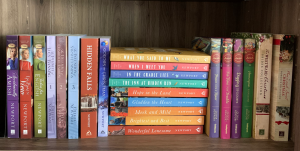We continue a summer series of guest posts from a variety of authors. Welcome Sus Harrison.
 As a first grader, I decided I was brave enough to tackle the biggest slide on the school playground. The line of kids for that slide was always long, so I gathered my courage and climbed the formidable ladder to the very top, one slow run at a time. Then it was my turn. I stood there and look down that terribly narrow, terribly long slide and decided I wasn’t as brave as I thought. The kids behind me weren’t happy when I insisted that they all climb back down so that I didn’t have to slide down, but they did, and the jeers I received were well worth my escape from the Long Side Down.
As a first grader, I decided I was brave enough to tackle the biggest slide on the school playground. The line of kids for that slide was always long, so I gathered my courage and climbed the formidable ladder to the very top, one slow run at a time. Then it was my turn. I stood there and look down that terribly narrow, terribly long slide and decided I wasn’t as brave as I thought. The kids behind me weren’t happy when I insisted that they all climb back down so that I didn’t have to slide down, but they did, and the jeers I received were well worth my escape from the Long Side Down.
I’m a little braver now, but, like most adults, I still face fears, including those relating to my chosen career and passion—writing novels. However, I have learned a few tricks that help me face and conquer the Long Slide Down.
Three writing challenges that no longer scare me:
DEVELOPING THE VOICE
Few things convey the writer’s skill more dramatically than the narrative voice of a novel. For something so important, voice is difficult to define, but let me give it a try. (You knew I would, right?)
 The Voice is the person you hear talking in your head when you read a book—the vivacious speaker/storyteller/magic genie whose voice spills out of the pages.
The Voice is the person you hear talking in your head when you read a book—the vivacious speaker/storyteller/magic genie whose voice spills out of the pages.
When a reader begins your novel, or an agent or editor is taking that first look at your unpublished manuscript, a strong voice will keep them going past that first paragraph.
So, how do you and I get there from here?
1. We need to gain expertise using the literary devices that allow us to develop The Voice. These devices are basically a series of choices: long or short phrases; lots of commas or few commas; simple or complex sentences or combinations thereof; fancy words, short words, old-fashioned words or modern words; short or long paragraphs.
2. We must define the aura we are trying to convey. The Voice is an incredible way to pull a reader into an era or situation. Words in a romance can be flowing. In a suspense novel, we might choose short and jerky. To depict a casual situation, we can try contractions, but if the book needs a more formal tone, we may choose to eliminate contractions.
3. Once we have a page or two written, we need to check out The Voice by reading those pages out loud. Does The Voice pluck us out of the real world and plop us down into the world of our novel? If not, it’s time to try again!
THE TITLE
When I was writing the third book of my first trilogy, my publisher offered me a contract for the next three books. All I had to do was come up with three titles. One of my chosen titles was Grandmother Sun Grandfather Moon. My first inkling that Grandmother Sun Grandfather Moon wasn’t going to work came when I began referring to the novel as GUS/GUM. Here are a few things I’ve learned since about choosing The Title.
1. People hate titles that are awkward to pronounce (like GUS/GUM for examples).
2. Readers will find it difficult to remember titles that lead off with a word that begins with a vowel. (This is something I haven’t heard mentioned before, but check it out. I think you’ll find it’s true.)
3. Book buyers will hesitate to ask for or about a book that has a title they can’t pronounce.
4. Commas in the title screw up the computerized alphabetical system used by some book distributors. (Personal experience on that one—I lost some sales on Mother Earth, Father Sky because of that glitch.)
Once we do have The Title, then we should Google it. If a million other books have the same title, we probably should go back to Step 1!
THE WALL
 Maybe you’ve heard marathon runners talk about hitting THE WALL, that moment when they feel they can’t take another step.
Maybe you’ve heard marathon runners talk about hitting THE WALL, that moment when they feel they can’t take another step.
Writing a novel is much like a marathon. It requires endurance. Almost always, when I’m writing that tough first draft, I experience a time when the words stop and my inspiration dies. After I indulge in a little panic dance—nothing major, just an oh-no-I’ll-never-write-again moment—I take the following steps:
1. I remind myself that THE WALL happens to me with every book.
2. I spend a couple of minutes (not much longer) jotting down where I want to go next. Nothing is too stupid or out-of-the-box to qualify as a possibility.
3. I take a free day to do exactly what I want.
4. I pray for inspiration and determination.
THE WALL is often the brain’s way of asking for a break, so we need to give ourselves a break, but after that we should continue writing. I’ve always found that once I punch my way past that mental and emotional block, I experience a euphoria of achievement that carries me right through to the last word.
What scares you when you contemplate writing your novel? Have you ever hit THE WALL or wilted when you had to come up with THE TITLE or develop THE VOICE? How do you conquer your fear when you face the Long Slide Down.
Sue Harrison’s first novel, Mother Earth Father Sky, was a national and international bestseller and was named by the American Library Association as one of 1991’s Best Books for Young Adults. Her other novels include My Sister the Moon, Brother Wind, Song of the River, Cry of the Wind, Call down the Stars, and Sisu. Her novels have been honored as main selections and featured and alternate selections of the Literary Guild and Doubleday Book Clubs and have been published in more than twenty countries and in thirteen languages. Harrison is currently writing suspense novels for the inspirational market.
Books by Olivia Newport:
The Pursuit of Lucy Banning (May 2012)
Accidentally Amish (October 2012)
The Dilemma of Charlotte Farrow (January 2013)





Love your tips with The Wall. It has happened with all of my books, too.
I’m learning to become more discerning about when I need a break.
And yeah for voice and titles!
~ Wendy
Thank you, Wendy! The first time I hit the wall, it scared me. Now I try to remind myself that it’s just part of the process!!
Great blog Sue Harrison… (local fan)
Thank you, Tammy!
Thanks for sharing how your conquered some of your writing challenges, Sue. I’m wrestling a few of my own — and one of them today is The Wall.
That wall, Beth. It looms up at us all. Sometimes at the most unexpected times. Sending up a prayer as you conquer yours!
Great approach to The Wall. I feel like I’m in a similar place right now. Just jotting something down — anything! — is just the right gentle push I need.
— Tom
Boy, that works for me, Tom. Most of the time I think I just have to convince myself that I can still write!
Hi Sue,
A long time ago, in a land far away I was super afraid of The Voice. Afraid I had no voice, afraid no one would like my voice, and afraid the other kids on the playground would make fun of my voice. Somewhere along the way I found my voice but still think I need to work hard to find ways of expressing the voice. 🙂 I wonder if this is at all related to growing up in the era of “Children should be seen and not heard?” Hmm. Fun post. Don’t want to think about the Wall.
I think we’re better off not thinking about the wall unless we’re facing one, Jill. I love your idea about “children should be seen…” That’s true. Our generation spent many silent hours. I used to tell myself stories to pass the time…
Great post Sue, and thank you for these helpful tips! Each step includes practical and insightful information that I can use! I always hear people talk about writers needing a strong voice but have never seen the steps for how to develop that voice laid out so clearly. I have hit the wall several times (I like the marathon comparison :)) and I tend to write whatever gets me to the next step. I can always go back and edit. Thanks for sharing your experience.
Thank you, Nicole. I think you’ve hit on the secret to scaling the wall, Nicole. JUST WRITE!!
Olivia, thank you so much for allowing me space on your blog today. I’m sorry that some of my replies are so late in the day. I had a travel day and presentation evening. How wonderful to come home to your blog readers and to you!